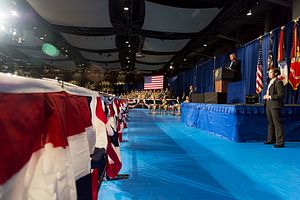Trump should trust his instincts. His long-running stance that the United States should no longer spend taxpayers’ money on foreign soil in attempts to stabilize other countries and fight terrorism was probably the most judicious. After his carefully curated speech on the United States’ renewed condition-based Afghan policy — what many are calling old wine in a new bottle — his friends over at Breitbart News are suitably irked, labeling it “flip-flopping.” Arguably, if for 16 years, U.S. presence in Afghanistan — all the attendant economic and military sacrifices — neither helped rebuild the nation nor eradicate terrorist factions, how can it now?
Trump went on to reproach Pakistan on harboring and providing safe havens to “agents of chaos.” Unsurprisingly, this so-called lambasting is not new. Perhaps Trump’s words come with a slight change in tone compared to his predecessors, but the message remains the same. It is a common belief in Washington that Pakistan plays a duplicitous game. And for years, the United States Congress, media, and think tanks alike have called out Pakistan for the same. A lawmaker in the House of Representatives introduced a bill which would instruct the U.S. State Department to make a determination on whether Pakistan was state sponsor of terrorism back in March. The bill’s sponsor, Texas Republican Ted Poe called Pakistan an “untrustworthy ally” which “has aided and abetted enemies of the U.S. for years.”
Successive U.S. governments have used economic and military aid as a bargaining chip in order to keep Pakistan in check. The choice to cut funding to Pakistan is an inherited policy from past administrations including Obama who substantially cut down funding since 2009. It didn’t prove productive back when Pakistan was a key ally in America’s war on terror, can it now when Pakistan is economically stronger than before and relations between the two countries have already been tense for some time?
It is clear that Trump lacks nuance in most matters of policy. To him, diplomatic relations are tantamount to some form of transaction, and it would make sense for him to issue such a forewarning to Pakistan. The more troubling part of his speech however, was seeking India’s cooperation to help stabilize the region, in exchange for the positive trade balance the country enjoys with the United States. This too reads as transactional, but it also sends another message — much like Obama’s pivot toward India, that America values India as a problem solver, a positive influence, in stark comparison to troublemaker Pakistan.
This was probably not unintentional. Perhaps the new administration believes it best to pressure Pakistan while handing India the baton to lead peace in the region. However, it is highly unlikely that this would come to fruition. In Pakistan’s view, India is not the boss; neither is it the predominant regional power. In Pakistan’s view, India uses Afghan soil to flare violence in Pakistan’s border regions.
For better or for worse, Pakistan seeks parity with India, even if that may not be an achievable goal given India’s economic prowess and strong growth. Inserting India into Afghanistan, not understanding the bloody history between Pakistan and India with the former’s concerns over India’s presence on its borders, is reckless and will lead to more, not less regional tension. At its best, it will ignite a war of egos. At worse, military sparring.
The question is, what bargaining power does the United States have over Pakistan and how should it be used? Funding has already thinned, with the latest $900 million expected to be slashed to half. Pakistan’s market access into the United States is less than 0.2 percent, while Pakistan’s exports to the United States as a share of all exports have fallen to 15 percent from 23 percent a decade ago. Business relations have dwindled with FDI sharply dropping.
In contrast, China’s investment and economic interests in Pakistan have expanded, where CPEC is an integral fixture of the one-belt-one-road (OBOR). China’s unwavering support for the country should not be underestimated. Not least because of its “friendship,” or even its rife with India, but because China’s returns are dependent on stability in Pakistan and it will protect its investments if it comes to it. In fact, shortly after Trump’s speech, Chinese foreign ministry spokesperson responded firmly: “We believe that the international community should fully recognize Pakistan’s antiterrorism efforts.” Russia has also come out to defend Pakistan.
There is no doubt that it is in Islamabad’s long term interests to keep Washington as a cooperative ally, and manage its relationship with the United State alongside its ties with China, Russia and other countries. But the United States also needs to be less combative and find the path of least resistance. Pakistan still has some importance — it provides the best land route for U.S. supplies into Afghanistan. A constructive (rather than instructive strategy) could be to bring Beijing into the conversation. China holds considerable influence over Pakistan, and could work to convince the South Asian nation to substantively tackle the Haqqani network.
While it is clear that Trump has no desire to be a moral leader who is in South Asia to build nations; if he is going back into Afghanistan guns blazing to fight terrorism, there are two things he cannot do: pit Pakistan and India against each other by inviting India to take charge, thereby feeding Pakistan’s paranoia; and will Pakistan into submission by using a leverage (i.e. aid) that may have existed once but no longer does any more. Times have changed; and so should U.S. foreign policy on Pakistan.
Huma Sattar is an economic analyst working in Pakistan.

































